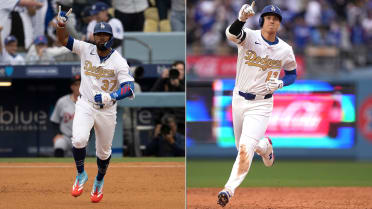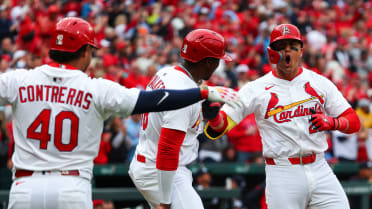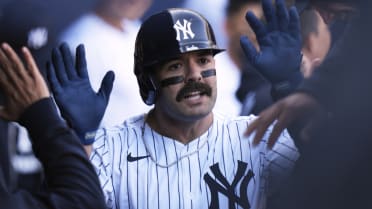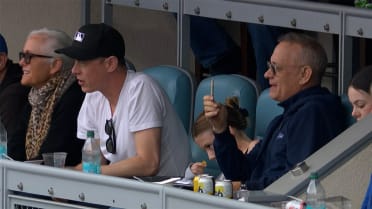NEW YORK -- Entering Tuesday, Robinson Canó’s career included 317 home runs, eight All-Star appearances, 51 postseason games and a World Series ring. It featured multiple five-hit performances and six-RBI games, but until Tuesday, had never included a three-homer night.
He broke into a wide grin.
“As a player,” Cano said, “there are a lot of things in the game that you would like to do to see how it feels.
“And this really feels good.”
Cano’s first career three-homer game provided all the Mets’ offense in their 5-2 win over the Padres at Citi Field. Perhaps more importantly, it offered the team evidence that one of its most significant offseason acquisitions still has plenty to give at age 36.
“You don’t hit three homers if you’re declining,” manager Mickey Callaway said.
Certainly, decline does not typically resemble this: In the fourth inning at Citi Field, Cano mashed a Chris Paddack changeup 399 feet into the second deck in right. Two innings later, with a man on base, Cano launched a curveball 408 feet into the Mets’ bullpen. Then, in the seventh, Cano parked a 95-mph Logan Allen fastball in a similar spot as his first home run, just a few rows deeper.
The home run outburst gave Cano five in his last nine games, after he hit four in his first 66 contests as a Met. He became the 13th player in franchise history to record three homers in a game, the first since Yoenis Cespedes in 2017, and the oldest second baseman in big league history to accomplish the feat.
“You don’t get to see three-homer-game nights, let alone somebody’s first, all the time,” said Mets starter Jason Vargas, who held the Padres to one hit in six innings to earn the win. “He’s done a lot of things in the game and I think this is probably a pretty special night for him.”
Added Paddack: “We got beat by one guy.”
For Cano, the night was a bit of vindication several weeks in the making. Even before Tuesday, Cano had increased his expected slugging percentage 57 points and nearly doubled his isolated power in nine games since the All-Star break, according to Statcast data. Albeit in a small sample, Cano had demonstrated marked improvement at the plate, following a first half that saw him hit .240/.287/.360.
Cano simply had not put it all together into a game like Tuesday -- a game in which his improvements were plain to the naked eye.
“We were seeing signs of it, obviously a little ways back when he was hitting balls hard, but hitting it at people,” Callaway said. “You could see the power and the stroke coming. He’s done a great job of working hard. He’s been on a plan. And he’s been working diligently every day to have a night like tonight.”
Cano’s breakout may have come too late to save the Mets, who remain far enough beyond the fringes of National League postseason contention that they’re likely to sell off two-fifths of their rotation -- Vargas and Zack Wheeler -- prior to the July 31 Trade Deadline. But it does offer the team, which is tethered to Cano through the 2023 season and beyond his 40th birthday, optimism that he can still be a middle-of-the-order threat. The Mets are responsible for the bulk of the $96 million remaining on Cano’s contract after this year, and can ill afford to see that money turn into a sunk cost.
Ask Cano, and he’ll say he never had a doubt. He spoke Tuesday of how hard he works during the offseason, driving an hour each day to lift weights with his personal trainer. Last summer, after returning from a PED suspension in mid-August, Cano hit .317/.363/.497 down the stretch -- numbers strong enough for his former agent, Brodie Van Wagenen, to make Cano the centerpiece of a seven-player deal that also netted the Mets' underperforming closer, Edwin Diaz.
In many ways, Van Wagenen’s early legacy depends not upon Cano enjoying these types of splashy three-homer games, but on him giving the Mets steady health and production over the life of his contract.
“What’s happened has happened,” Callaway said. “We’ve been working hard to right everything that’s gone bad. That’s what we’ll always do. It’s hard to look back and have regrets. We’ve worked hard since Spring Training. We wish our record was better at this point, obviously. … But to have regrets in the past wouldn’t be productive, so we’re moving forward.”
Senior Reporter Anthony DiComo has covered the Mets for MLB.com since 2007.




